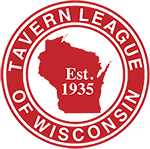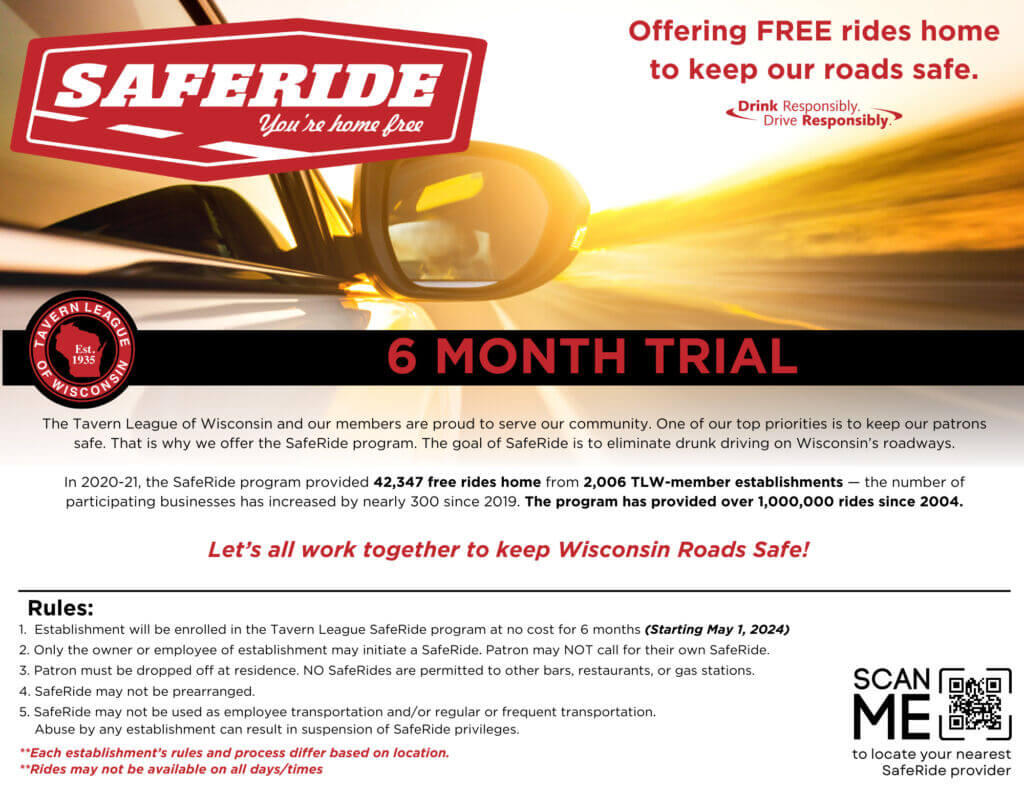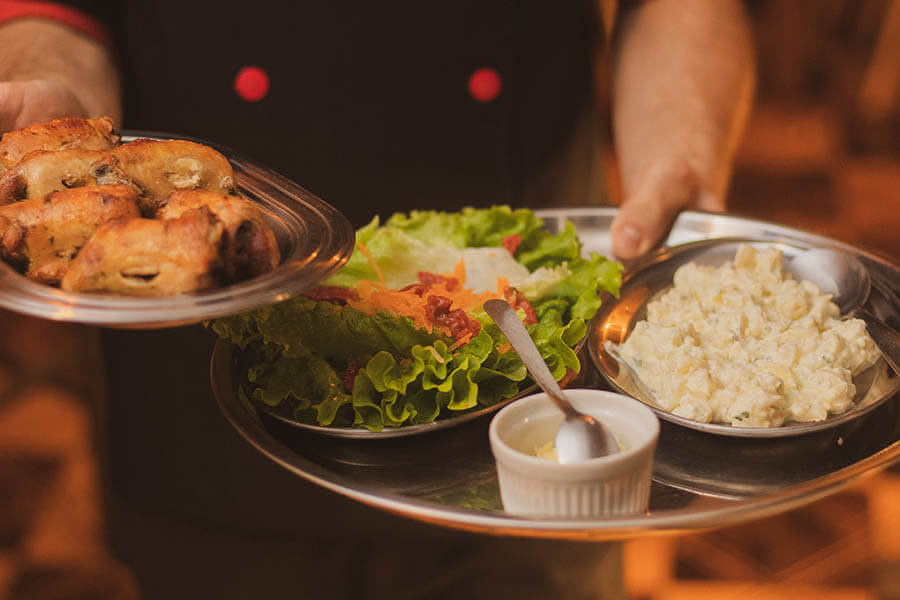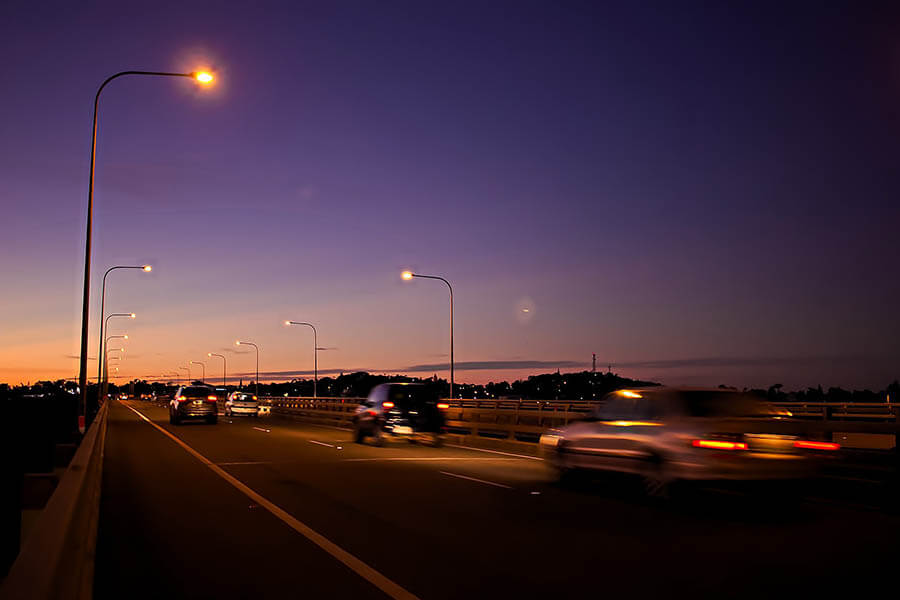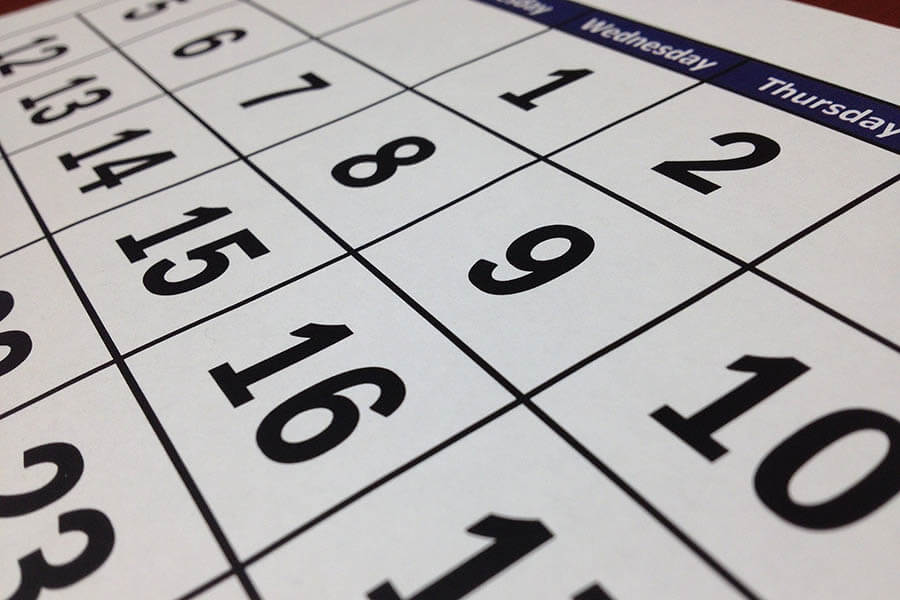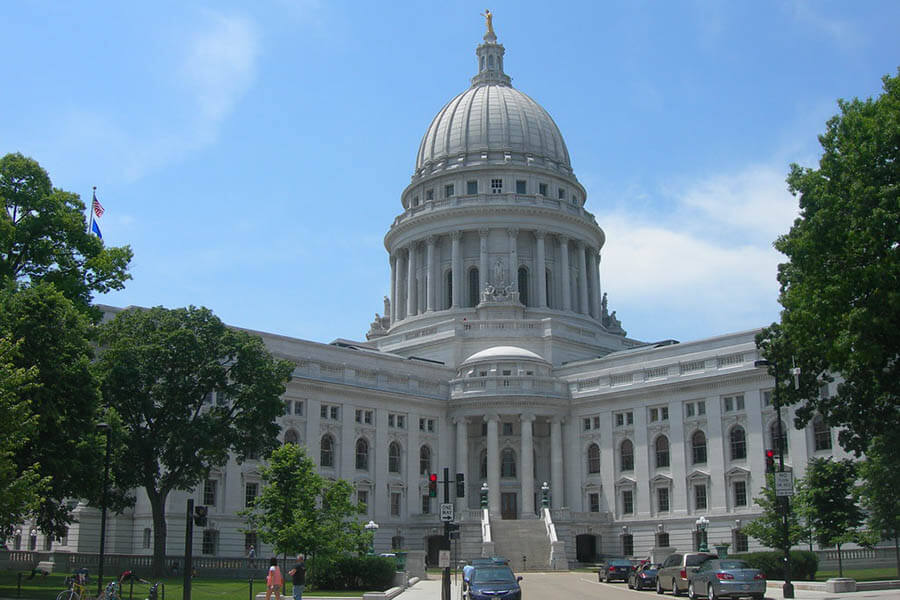Mark Your Calendar
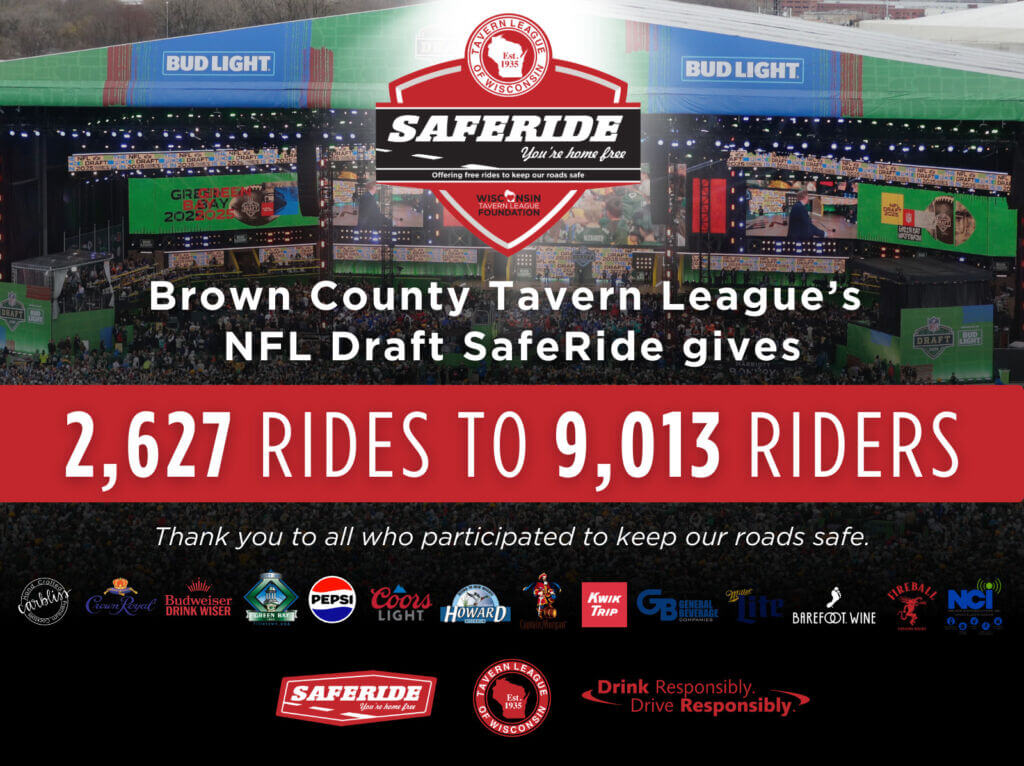
Brown County Tavern League’s NFL Draft SafeRide gives 2,627 rides to 9,013 riders
Green Bay…The Brown County Tavern League is earning widespread praise this week for helping keep area roads safe during the NFL draft. The shuttles helped get over 9,000 people to their destinations through the SafeRide Program.
“We knew there was a pressing need for a SafeRide service at the NFL draft, having heard of previous drafts where people were stranded for hours waiting for ride shares and taxi’s. That could lead to a lot of people behind the wheel who should not be,” said Don Mjelde, Vice-President of the Tavern League of Wisconsin. The SafeRide efforts helped contribute to just three OWI arrests reported by the Brown County Sherriff’s office during the draft.
In the end 2,627 rides were given to 9,013 riders free of charge. The costs were picked up by the Wisconsin DOT, through a state mandated DUI surcharge, and a matching grant from the Brown County Tavern League, who have been busy raising money for the effort in recent months.
Mjelde and Brown County Tavern League President Tera Hansen are both passionate about the SafeRide program, which gives over 40,000 free rides statewide each year and has contributed to a 44% decline in OWI convictions and a nearly 50% reduction in alcohol related deaths since 2007.
The Brown County Tavern League operated 40 shuttle vans, with 91 drivers who put in over 2,000 hours on the road. To make draft attendees aware of the program, the Tavern League distributed over 20,000 brochures to 250 taverns and hotels in Brown County. The shuttles operated for over 60 hours over four days, running until 3:30am every night.
The Brown County Tavern League would like to thank the many people who came together to make the operation a success, including their SafeRide Draft Committee who helped organize and staff the operation from start to finish, and their many partners and sponsors.
SafeRide Committee
- Ben Brunette
- Tera Hansen
- Terri Vande Hei
- Brandi Hibbard
- Rob Heinritz
- Don Mjelde
Sponsors
Enterprise: attained 40 transit vans from 5 different states.
Kwik Trip: Supplied gas cards and donated $5,000 towards costs.
Creative Sign: installed at removed decals. Put together an assembly-line fashion at their shop in a single day, and removed them Sunday morning.
Nielson Communications: Radio transmissions including Hytera radios used for GPS tracking, which was invaluable throughout the dispatch process. Steve actually reached out to us, and offered to supply the equipment for free.
City of Green Bay: awarded us $15,000 through an ARPA grant for improving business and safety in our community and teamed up on a press conference to launch the program and spread public knowledge and get word out to riders.
Village of Howard: $5,000 donation towards our program and allowed shuttle parking by Duck Creek Quarry.
Brown County Sheriff’s Department: Screened shuttle drivers for the draft and supported us in our effort to keep our roads safe.
Discover GB: Gateway of communication, did a great job of logistics and comms.
SP+, NFL, Green Bay Packers: Gave their full support and cooperation to make this possible.
General Beverage: On top of a monetary donation, they went above and beyond with assistance in marketing/promotional, with additional vinyl adhesive QR codes and tabletop advertising for nearly 200 members.
Badger Liquor, Dean Distributing, Triangle Distributing, Kay Distributing, Carbliss & Pepsi: Donated to the effort
The SafeRide Drivers: Their commitment to their community along with their professionalism, time and effort under trying circumstances made this entire effort possible.
New Alcohol provisions to go into effect May 1, 2024
Reduces Penalty for Retailer-to Retailer Beer Purchases
- The bill lowers the penalty from a felony to a civil forfeiture not to exceed $100 for a tavern to purchase 15 cases of beer a month from a liquor store without going through a wholesaler. A similar provision currently exists in state law for the purchase of up to 12 liters of booze a month.
Creates Uniform Closing Hours for Retailers and Producers
- The bill requires all breweries to have the same closing times as Class B licensed establishments.
Increases SafeRide Funding
- The bill will increase the OWI surcharge for the TLW SafeRide Program by 33%. In addition the bill will expand the use of the SafeRide Program to all license holders in Wisconsin for a 6 month period. The TLW will coordinate with non-members to use our SafeRide Program and we will solicit them to join the TLW to have permanent use of SafeRide as well as all TLW programs. This change represents a great opportunity to recruit new TLW members.
Requires SafeRide Program Notification upon License Issuance
- The new law requires municipalities to provide information regarding a free six month participation in the TLW SafeRide Program every time a liquor/beer license is issued. This change will introduce the TLW and our SafeRide Program to every applicant for a liquor license in Wisconsin. This change will present the opportunity to increase membership in the TLW as well as our SafeRide Program.
Allows Recapping Bottles of Wine
- The bill allows an opened, unfinished bottle of wine to be removed from the restaurant if, among the other requirements, it is recapped with the original cap, rather than recorked.
Clarifies Axe Throwing Facility Licensing
- The bill permits a retail license to be issued for an axe throwing facility and allow an underage person to be on the premises.
Expands Brewery Winery and Distillery Retail Sales / Full Service Taprooms
Creates Statutory Framework for Contract Production
Expands Small Winery Cooperative Wholesaler Permit to Include Distilled Spirits
Clarifies Hard Seltzers as Fermented Malt Beverages
Doubles Brewpub Production and Self-Distribution Caps
Removes Cap on Number of Production Permits for Intoxicating Liquor
Creates Wine Only Bars / Remove Certain Class C Wine License Restrictions
Increases the Number of Manufacturer’s Permits per Legal Entity
Standardizes Hours of Operation for Nonretail Activity
Allows Producers to Bring Alcohol Beverages to Licensed Retailers to Provide Free Samples
Allows Brewpubs to Satisfy Permit Requirement Through Sale of Beer from Another Brewpub
Expands Availability of Winery Permits to Manufacturers and Rectifiers
Allows Premixing of Cocktails by Class B License Holders
Clarifies Taxation of Alcohol Sales Between Producers
Allows Wineries to Sell Wine to Other Producers
Following Provisions Effective December 8, 2023
Extends Closing Hours during Republican National Convention
- The bill creates a closing hour exception, during a 2024 national political convention in Milwaukee, for Class “B,” “Class B,” and “Class C” licensed retailers, and for producers' full-service retail outlets and production premises, located in Kenosha, Racine, Walworth, Rock, Milwaukee, Waukesha, Jefferson, Dane, Ozaukee, Washington, Dodge, Columbia, Sheboygan, or Fond du Lac County. Under the bill, during the convention period, the closing hours are between 4 a.m. and 6 a.m. However, a municipality may designate a retailer or producer as ineligible or disqualified for the extended closing hour and may, by ordinance, opt out of the extended closing hour during the convention.
Creates Division of Alcohol Beverages
- Creates the Division of Alcohol Beverages (division) attached to the enforcement functions to the division.
Following Provisions Effective January 1, 2024
Modifies Cross-Tier Restrictions to Allow Incidental and Indirect Interests
Following Provisions Effective January 1, 2025
Creates Statewide Alcohol Beverage Seller/Server License
- Under provisions of the bill the Department of Revenue will create an operator’s license which can be acquired through the DOR website and will be permitted for use statewide. Local governments can still issue an operator’s license but this change will provide much more flexibility to employers and bartenders to quickly obtain a license from the DOR which can be used statewide.
Expands Small Winery Cooperative Wholesaler Permit to Include Distilled Spirits
Imposes Common Carrier and Fulfillment House Requirements
Following Provisions Effective January 1, 2026
Creates Public Place and Event Venue Regulations
- Requires wedding barns and event venues to obtain the proper alcohol license in order to operate. All wedding barns and event venues will now be required to have a liquor license to hold events. That provision of the bill has a delayed effective date of 24 months. Wedding barns and event venues will be required to purchase all alcohol through a licensed wholesaler and no longer allow people to bring in their own alcohol.
News
New Maps
Last Spring, Milwaukee County circuit court Judge Janet Protasiewicz easily won election to the open seat on the Wisconsin Supreme Court. Her election swung the balance of the court to a 4-3 liberal majority setting in motion the rewriting of Wisconsin’s legislative districts.
Shortly after her swearing in to the Court the new liberal majority granted writ to a case seeking to rewrite all state legislative districts. In December, in a 4-3 ruling, the State Supreme Court ruled Wisconsin’s legislative districts were unconstitutional and required new maps to be in place by the 2024 election. The Court set a deadline of March 15th for new maps to be in place. They provided alternative options to establish new maps and if the Legislature and Governor could not agree on new maps the Court would establish new districts.
On February 19, 2024, Governor Evers signed legislation he introduced rewriting Wisconsin’s legislative districts thereby bringing an end to the long legal battle to create new legislative districts.
Republicans currently hold sizable majorities in both houses. In the State Senate Republicans have a 22-11 advantage and, in the Assembly, hold a 64-35 majority. Without question the Democrats will gain seats in both houses as a result of the new maps but Republicans should be able to retain majorities in both houses. All 99 Assembly seats are up for election in 2024 while the even numbered seats of the State Senate will face election.
The new maps create 43 paired legislators, 7 open seats in the Senate and 15 open seats in the Assembly. The pairing of 43 legislators means at least 22 legislators will not be coming back in districts they are currently representing. Some may move to run in open seats. For the first time in nearly 20 years legislative Democrats will have a chance to make significant gains in the Legislature but not likely to take control in either house.
Paired Legislators (new maps put these legislators in the same district)
Paired Republican Senators:
John Jagler – Joan Ballweg
Julian Bradley – Van Wanggaard
Rob Cowles – Eric Wimberger – Andre Jacque
Dan Knold – Duey Stroebel
Paired Democrat Senators:
Melissa Agard – Kelda Roys
Paired R/D Senators
Jesse James (R) – Jeff Smith (D)
Paired Republican Representatives:
John Macco – Shae Sortwell
Amy Binsfeld – Paul Tittl
Ty Bodden – Ron Tusler
Tyler August – Amanda Nedewski
Elijah Behnke – David Steffen
William Penterman – Jon Plumber
Nate Gustafson – Mike Schraa
James Edming – Rob Summerfield
Nik Rettinger – Chuck Wichgers
Donna Rozar – John Spiros
Cindi Duchow – Scott Johnson
Paired Democrats
Mike Bare – Alex Joers
Paired R/D Representatives
Bob Donovan (R) – Dan Reimer (D)
Karen Hurd (R) – Jodi Emerson (D)
Tavern League of Wisconsin partners with Hogs For Heroes to purchase bike for war veteran from Neenah
August 28, 2022 – This week, Army National Guard Veteran, Master Sergeant Jake Spangenberg of Neenah becomes the ninth Wisconsin…
Read MoreMay is National Tavern Month
Celebrating the social and economic impact of Wisconsin’s bars, taverns and restaurants The Tavern League of Wisconsin (TLW), along with…
Read More